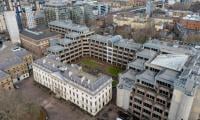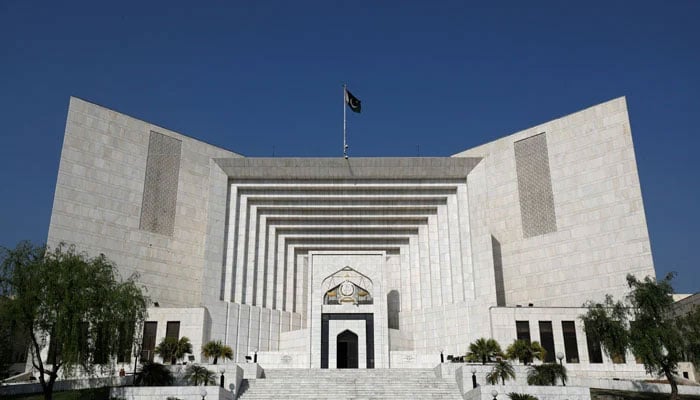After reserved seats ruling: Former SHCBA chief urges PTI rethink over opposition to SC practice law
CJP Qazi Faez Isa had openly supported the Practice & Procedure law even after he became the chief justice
KARACHI: Those in the PTI opposing the Supreme Court Practice & Procedure Act may want to rethink their stance after the Supreme Court’s reserved seats case verdict.
In a post on X (Twitter) on Saturday, former president of the Sindh High Court Bar Association Barrister Salahuddin Ahmed pointed this out, writing that: “In rightful celebration of [the] SC judgment, I wonder if some PTI friends [are] now reviewing their opposition to the SC Practice & Procedure Act [and] support for [the] CJP’s God-given right to form benches.”
For context, the SC (Practice & Procedure) Act, 2023 has provided a transparent process for the formation of benches for hearing crucial constitutional issues. It also says that a decision to take up a matter suo-motu would be made by a three-member bench, comprising the CJP and the two senior-most judges of the apex court -- instead of this power being solely held by the CJP. The law also gives parties the right to appeal to the Supreme Court within 30 days of a final order from a lower court.
Why this becomes important in the current scenario is because Friday’s reserved seats verdict was given by a full-court bench, and the CJ was not in majority. CJP Qazi Faez Isa had openly supported the Practice & Procedure law even after he became the chief justice.
Salahuddin noted in his post on X that upholding the Supreme Court Practice & Procedure Act is “one of [the] great legacies of [the] QFI court even as it left him a minority in the SC.”He recalled that the last CJP who was in “minority in a major constitutional case was Nasir ul Mulk in [the] 21st Amendment case. CJPs after that (especially Saqib Nisar & Bandial) just formed humkhayal benches so they were never in minority.”
According to Salahuddin Ahmed, “structural reform should not be sacrificed at [the] altar of political expediency. Allowing CJPs to dominate the court through bench/case fixation was a bad idea then and now. Regardless of who is CJP.”
-
 Kanye West Eyes Performing First-ever Concert In India
Kanye West Eyes Performing First-ever Concert In India -
 Brooklyn Beckham's Claim About Nicola's Wedding Ordeal Gets Challenged
Brooklyn Beckham's Claim About Nicola's Wedding Ordeal Gets Challenged -
 AI Horror: 4 In 5 Young Workers Fear 'AI Could Replace Their Jobs', Says Report
AI Horror: 4 In 5 Young Workers Fear 'AI Could Replace Their Jobs', Says Report -
 Missouri Couple ‘locked Sons In Chicken Pen, Shot Them’ In Shocking Abuse Case
Missouri Couple ‘locked Sons In Chicken Pen, Shot Them’ In Shocking Abuse Case -
 King Charles Receives 'delightful' Royal Baby News
King Charles Receives 'delightful' Royal Baby News -
 Chinese ‘mega Embassy’ Wins UK Approval In London Ahead Of Starmer’s China Visit
Chinese ‘mega Embassy’ Wins UK Approval In London Ahead Of Starmer’s China Visit -
 David Beckham Gives Telling Reaction To Brooklyn’s Public Complaints
David Beckham Gives Telling Reaction To Brooklyn’s Public Complaints -
 Can Ibuprofen Cut Cancer Risks? Study Finds Promising Breakthrough
Can Ibuprofen Cut Cancer Risks? Study Finds Promising Breakthrough -
 Piers Morgan Finally Reacts To Brooklyn Beckham's Statement About David And Victoria Beckham
Piers Morgan Finally Reacts To Brooklyn Beckham's Statement About David And Victoria Beckham -
 Tom Hiddleston Reveals Unlikely DC Character That Inspired Loki
Tom Hiddleston Reveals Unlikely DC Character That Inspired Loki -
 Prince Harry, Meghan Markle Warned 2026 Will Be 'a Big Test' For Them
Prince Harry, Meghan Markle Warned 2026 Will Be 'a Big Test' For Them -
 OpenAI Plans First ChatGPT Device For 2026
OpenAI Plans First ChatGPT Device For 2026 -
 Matt Damon Gets Slammed Over 'out Of Touch' Comparison
Matt Damon Gets Slammed Over 'out Of Touch' Comparison -
 From Chagos Islands To Greenland Trump Flags National Security Risks: Here’s Why
From Chagos Islands To Greenland Trump Flags National Security Risks: Here’s Why -
 Meghan’s UK Return As ‘successful Businesswoman’ Will Put Pressure On Kate Middleton
Meghan’s UK Return As ‘successful Businesswoman’ Will Put Pressure On Kate Middleton -
 Spotify Tests Page Match To Sync Books With Audiobooks
Spotify Tests Page Match To Sync Books With Audiobooks




